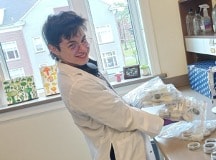
Project objectives:
•Identify fungi found growing on pieces of marine plastic from Nova Scotia beaches
•Quantitatively and qualitatively test their plastic biodegradation capabilities
•Compare them to strains of the same species not grown on plastic
The reason why some fungi can degrade plastic is the same reason why they degrade wood and other complex materials. These substrates are made of complex polymers which some fungal enzymes can break down! However, not a lot of research has been done to test the ability of marine fungi to biodegrade plastic, this research will help address the knowledge gaps.
Next steps of the project involve the utilization of mass loss analysis, as well as an FT-IR scan, on two types of plastic (PVC and PE) that has been in contact with the selected fungi for 30, 60, and 90 days. This will be done in order to determine their efficiency, and if there is a preference between the two types of plastics.
Arwen Estrada Perez
“I am in my third year of Environmental Science (ENVS Honours and Co-op), currently working with Dr. Allison Walker. Plastic pollution is an important issue given its negative impact on whole marine ecosystems, and it’s specifically important to me because I grew up in a place where plastic pollution was normal. This project is linked to my future plans in the way that I want to help to dispel the mysteries that surround fungi, as well as learn how to utilize them to our advantage. I love research because it allows me to fulfill my dream of becoming a mad scientist, only with fungi instead of lasers. The Irving Centre has been great for my research, mainly because of the people. Everyone is interested and willing to help!


 Acadia University
Acadia University